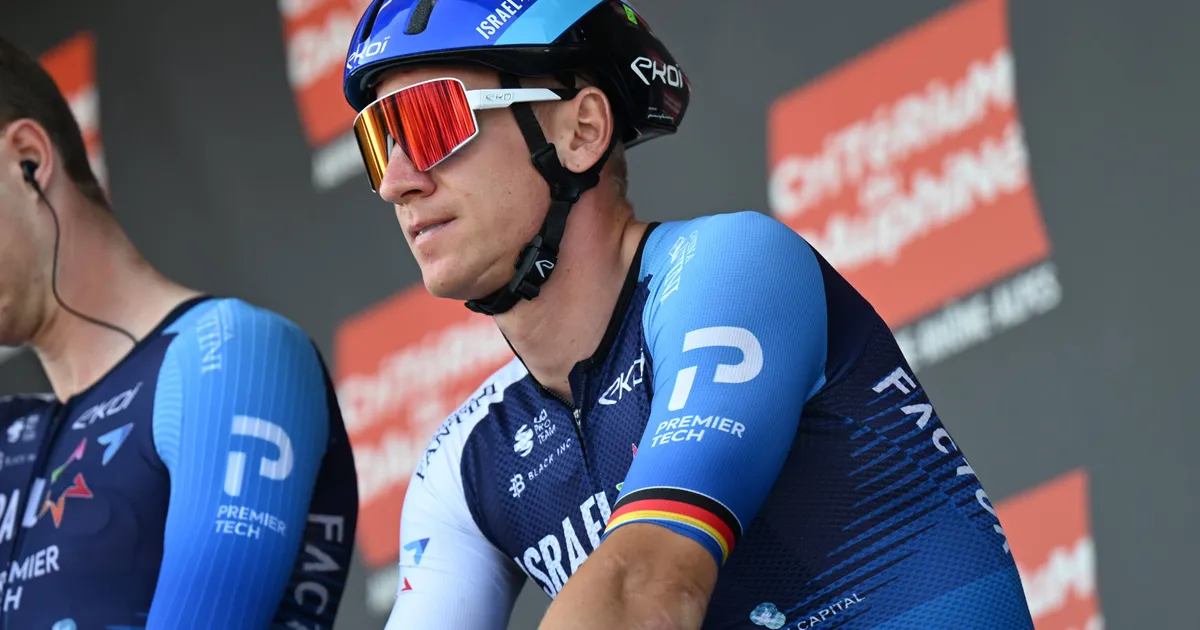Early Stages of the 2025 Criterium du Dauphine: A Sprinting Challenge for Pascal Ackermann
On paper, the first two stages of the 2025 Criterium du Dauphine were shaping up to be promising for Pascal Ackermann, Israel – Premier Tech’s former German national champion. Known for his explosive speed and tactical acumen in sprint finishes, Ackermann was anticipated to seize the opportunity to gather positive results. However, the dynamics of the race quickly turned challenging, revealing the complexities sprinters face in the modern cyclo-sport landscape.
A Chaotic Stage 1
The opening stage unfolded in dramatic fashion, showcasing a high-stakes contest that blended unpredictable tactics with fierce competition. Tadej Pogacar, a celebrated figure in the cycling world, outmaneuvered the field to secure victory during a tumultuous finale that involved prominent contenders like Jonas Vingegaard, Mathieu van der Poel, and Remco Evenepoel. The chaotic nature of this stage revealed a critical point of contention: sprinters often find themselves caught off-guard by the escalating pace set by general classification (GC) teams fighting for position.
Ackermann, who was expected to be among the frontrunners, found himself adrift, unable to capitalize on the opportunity as the intensity of the final moments pushed sprinters to their limits. The stage win by Pogacar not only highlighted his formidable capabilities but also emphasized the growing trend where GC riders actively participate in sprint finishes.
Stage 2: The Predictable Unravels
When stage 2 approached, expectations shifted as it seemed more structured and predictable. However, this stage too bore witness to the relentless pace dictated by climbers and GC-focused teams. Jonathan Milan claimed the victory, but Ackermann’s quest for sprint glory faced another setback. The climbs earlier in the race had tested the peloton, and as the intensity rose, Ackermann, along with many of his sprinting peers, found himself distanced from the main group.
Crossing the finish line over a minute and a half down in 128th position starkly illustrated the challenges he and others faced when the climbs began to dictate the race’s tempo. The swift increase in pace rendered it nearly impossible for pure sprinters to remain competitive in stages that had been traditionally suited for them.
Insight from Ackermann: The Sprinter’s Perspective
In a candid pre-stage 2 interview with TV2, Ackermann candidly expressed his frustrations regarding the evolving dynamics of sprinting in contemporary cycling. “That’s just how cycling is these days. It’s great entertainment for the spectators, but it’s a nightmare for us sprinters when they start riding like that," he lamented. This sentiment underscores a broader issue sprinters face as the aggressive tactics employed by GC teams increasingly shape race outcomes.
Yet Ackermann remained hopeful, hinting at the possibility of more favorable stages ahead, particularly in the upcoming Tour de France, where he anticipated a greater presence of teams focused on sprinting. “If we get the chance to sprint, we’ll take it,” he optimistically stated. This outlook reflects the resilience sprinters must cultivate in a sport that continuously evolves.
The Rise of GC Contenders in Sprints
The emergence of GC riders, such as Jonas Vingegaard, participating aggressively during sprint finishes adds another layer of complexity for sprinters. Although Vingegaard is not traditionally recognized for his sprinting prowess, Ackermann noted his impressive performance during the chaotic finale of stage 1. “Jonas has never been a weak rider, and that finale was a tough one,” he acknowledged.
However, this also raises concerns for pure sprinters like Ackermann. The increasing involvement of GC contenders in sprint finishes threatens to redefine who can compete in such scenarios. Ackermann added, “To us sprinters, it’s a real pain when Vingegaard also starts attacking and sprinting on the short, punchy stages – just like Pogacar does."
The potential for these riders to develop an affinity for sprinting presents a looming challenge for sprinters hoping to leverage their strengths in what was once considered a predictable domain.
The Sprinter’s Challenge in a Changing Landscape
Overall, the initial stages of the 2025 Criterium du Dauphine serve as a compelling microcosm of the evolving nature of road cycling. For sprinters, the challenges now encompass battling against the strategic maneuvers of GC teams that apply pressure early and often. Ackermann’s experiences in these stages illustrate how sprinters must navigate not only their own tactics but also adapt to a field that increasingly values all-around riding capabilities.
As the race unfolds, Ackermann’s determination to seize any forthcoming opportunities reveals a tenacity that is essential for success in such a competitive environment. His reflections on the racing landscape encapsulate the intricate interplay between sprinters and climbers, inviting spectators to closely follow the unfolding drama of the Criterium du Dauphine.


